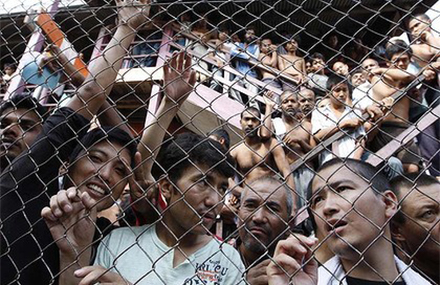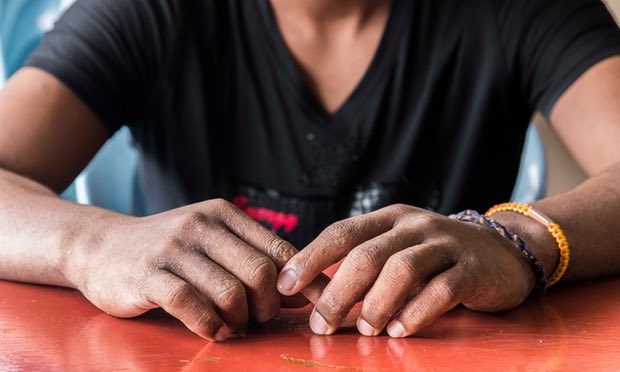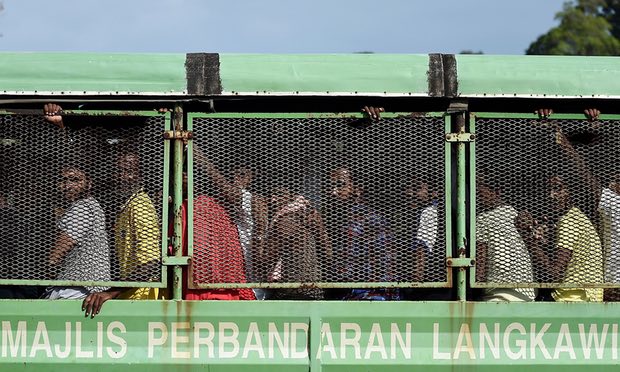Refugees Forced To Drink Toilet Water At Malaysian Immigration Detention Centres
160 detainees have died at various local immigration detention centres between 2014 and 2016.
In an exclusive report yesterday, 16 May, the Guardian revealed how dozens of refugees and asylum seekers live in deplorable living conditions at Malaysian immigration detention centres
An overcrowded immigration detention centre in Malaysia at an unspecified location. (Undated photo)
Image via Angeline Loh/AliranIn an article titled, 'Refugees describe death and despair in Malaysian detention centres', the British daily quoted the United Nations (UN) refugee agency as saying that 24 refugees and asylum seekers have died in Malaysia immigration detention centres since the year 2015.
UN told the Guardian that 22 of the people who died at the detention centers were Myanmar nationals and that the death toll could be a lot higher.
The situation is so terrible to the point that the Human Rights Commission of Malaysia (SUHAKAM), has described the living conditions at these centres as "torture-like"
The cells are said to be overcrowded with inmates who hardly have any basic necessities like water, food, and access to medical care.
The Guardian spoke to around 12 refugees who were recently-released and here's their account of how it was like living in the Malaysian immigration detention centres:
An 18-year-old Rohingya refugee, Mouyura Begum, was detained for a little over a year at the Belantik Detention Centre in Sik, Kedah, and she said that the detainees were deprived of drinking water there.
"They gave us only one small cup of water with our meals, otherwise we had to drink toilet water."
"Only when someone was about to die would the guards come. Otherwise, if we complained, or if we asked to go to the hospital, they beat us," said the teenager.
Meanwhile, another young refugee told the British daily that he was arrested despite being a registered person of concern with the UN refugee centre in Malaysia
All the refugees spoke anonymously as they retribution for their statements.
Image via Laignee Barron/The GuardianArrested during an immigration raid, the refugee was forced into an overcrowded cell at a juvenile detention facility and had to resort to drinking toilet water. He ended up with a skin rash that covered his body.
According to SUHAKAM, the most common disease contracted by the detainees is scabies, but there have been reports deaths caused by pneumonia, tuberculosis, and leptospirosis, a bacterial disease caused usually by the spread of rat urine in unhygienic conditions.
United Nations High Commissioner for Refugees (UNHCR) defines persons of concern as individuals to whom the UNHCR has "extended its protection and/or assistance services, based on humanitarian or other special grounds".
A 19-year-old Mon refugee from Myanmar said that the detainees had to sleep on the floor with their knees to their chest in the cramped cells. He was released from the Sungai Petani juvenile detention in April.
What's really disturbing is that the inhumane treatment at the detention centres went beyond depriving the detainees of basic necessities. They were also allegedly subjected to violence from the guards.
A refugee from the Kachin state in Myanmar said that he saw a Sri Lankan inmate beaten to death when he was being held at the Bukit Jalil detention centre. He was there for eight months.
"But they told us he died because he was sick," he said. The man apparently saw seven detainees die during his time there.
In conclusion, most of the refugees the Guardian spoke to admitted that they saw at least one inmate die during their time at the detention centres, with the cause of death usually being some kind of disease, but there have been times when it was due to physical abuse.
Amy Smith, the executive director of Fortify Rights, a non-profit human rights organisation, told the Guardian that the deaths of these refugees are "absolutely preventable"
Bangladeshi and Rohingya migrants arriving at the naval base in Langkawi to be transferred to a immigration detention centre in the mainland.
Image via Manan Vatsyayana/AFP/Getty Images via The Guardian"The fix is very easy - Malaysia just has to stop treating refugees like hardened criminals," added Smith.
Malaysiakini reported on 8 May, that 160 detainees have died at Immigration Department detention centres in just two years, from the year 2014 till 2016.
According the the Home Ministry, most of these deaths are caused by illnesses, including tuberculosis and HIV. The highest number of detainees that died are Myanmar nationals, 73 people to be exact. This is followed by 23 Indonesians and 14 Bangladeshis.
Most of the deaths occurred at the detention camp in Langkap, Perak - 40 detainees died there. 31 more died at the centre in Bukit Jalil and the remaining 28 died at the centre in Lenggeng in Seremban.
The news site said that the facts on figures on deaths at local immigration detention centres were part of a Parliamentary written reply to Kuala Kedah MP Dr Azman Ismail.
The Guardian further reported that the Malaysian Home Ministry has not responded to comment on this atrocious revelation.
However, the Immigration Department told SUHAKAM earlier last month, that they are facing budget restraints and resources which have put a dent on their ability to keep up with the international standards for healthcare of detainees.
SUHAKAM's chairman Razali Ismail said that the department had mentioned this during a meeting with the human rights commission in late March.
"Under international standards, detainees are entitled to the same level of medical care as individuals in the community at large but SUHAKAM notes that the Immigration Department is coping with severe budget and resource constraints," explained Razali, as reported by Free Malaysia Today on 1 April.



